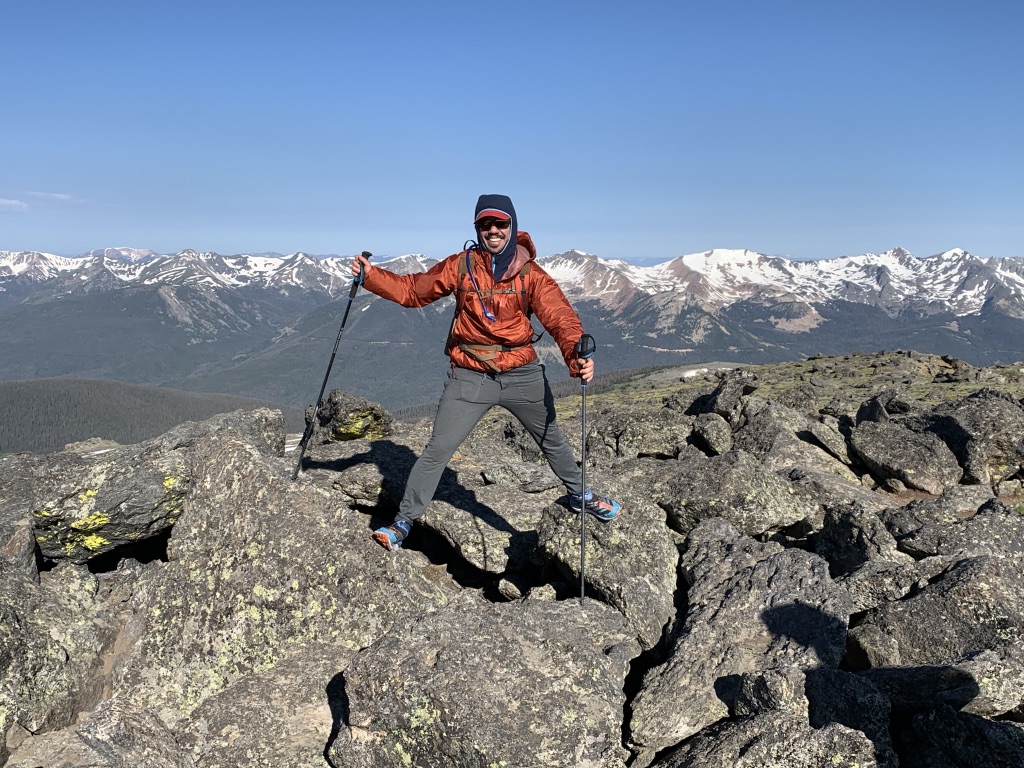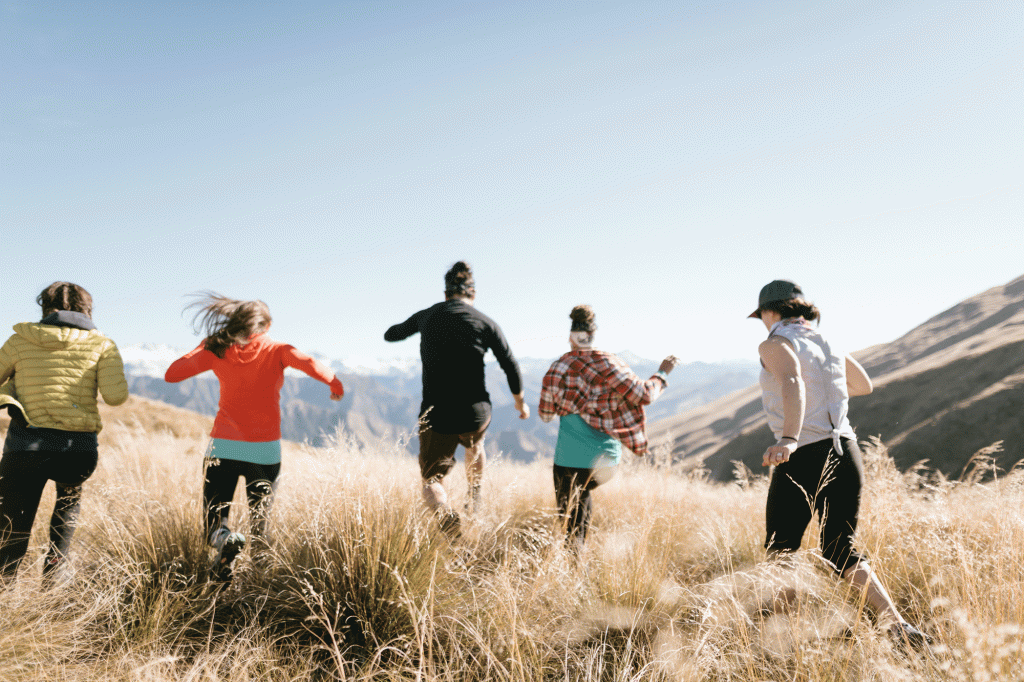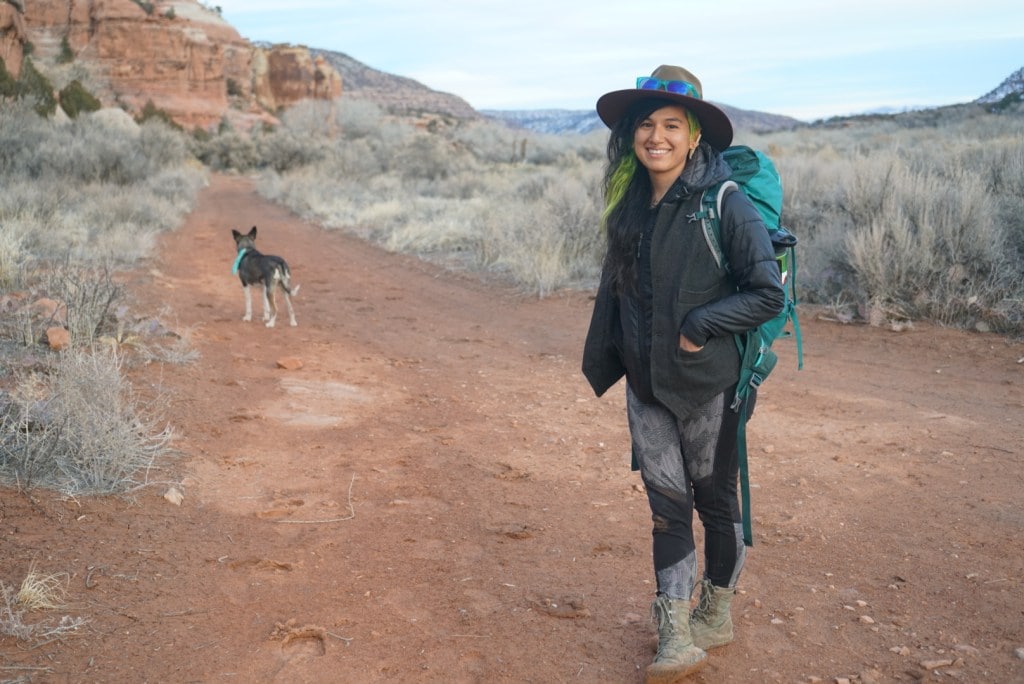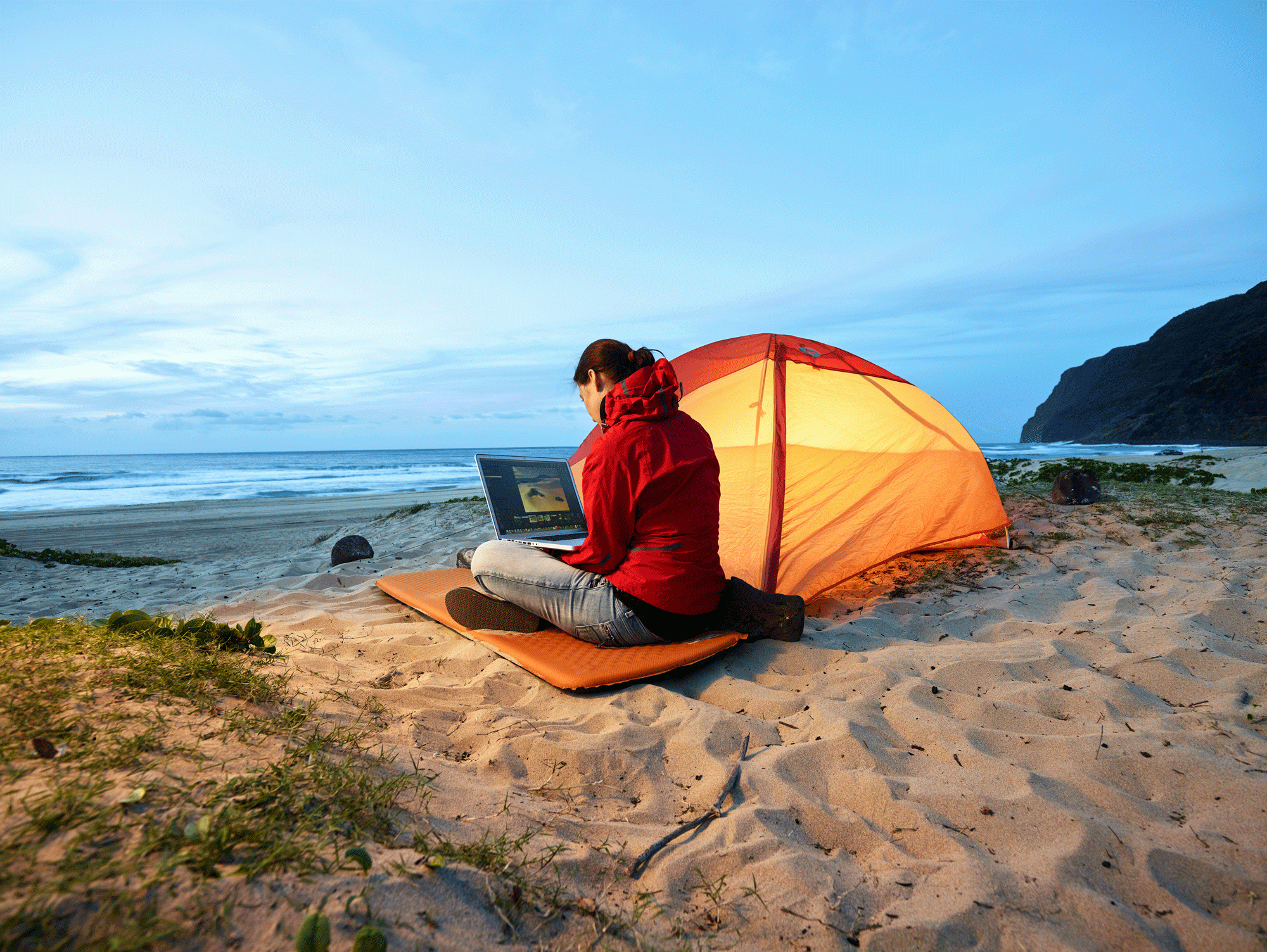Cassie Abel, age 36, had a decision to make. She was working at her dream job in Sun Valley, Idaho, when her company announced they were relocating their headquarters to Portland, Oregon. If she wanted to keep her job, she’d have to move.
Abel’s choice felt fraught. She loved Sun Valley’s community feel and proximity to public lands. (Nine percent of Idaho’s 53.5 million acres are protected with a wilderness designation, according to the Idaho Conservation League.) “Sun Valley has this calm pace of life and I feel really supported here,” she says. “It’s a four-season mountain destination, and you can’t find a better trail network for mountain biking and camping.”
Did she mention the backcountry skiing? It’s also great, and the mountains often feel relatively empty. Sun Valley also has a lot of big city amenities for a small town, Abel says. “It’s a really special place.”
It was this love of the outdoors—and Sun Valley, in particular—that eventually led Abel to make a choice that was counter to every decision she’d ever made in her life up to that point: to leave her dream job and stay in Sun Valley. “It was the scary choice, with so much unknown,” she says.
After quitting her job, Abel went on to launch White Cloud Communication, a marketing consulting company. She founded Wild Rye, a women’s outdoor gear company, several months later. Both function remotely but are based out of Sun Valley, so she can travel whenever and wherever she pleases. Abel is also the creator of Women-Led Wednesday, an annual event that supports businesses owned and led by women.
Perry Cohen, age 43, understands Abel’s experience firsthand. For 10 years, he worked as the vice president of leadership development and talent management at a corporation in New Hampshire. He often found himself staring out of his office window at the mountains in the distance, yearning for time outside. He was ambivalent about his job but says the thing that really drove him to make a change was his love of the outdoors.
“One day, I realized it was no longer good enough to be a weekend warrior, and that no paycheck was worth the confines of this office,” he says. “I left my corporate job and started my own outdoor adventure company, The Venture Out Project, where we lead trips for members of the LGBTQ+ community.”
Cohen went from working 60 hours a week in the office to working about 100 hours per week on his passion project. It wasn’t an easy switch, but he says it was much more inspiring to be doing work that really mattered to him, based in the outdoor environments he loved.

Perry Cohen, the executive founding director of The Venture Out Project, says he used to stare wistfully at mountains from his corporate office. Now, his company leads trips for members of the LGBTQ+ community. (Photo Courtesy: Perry Cohen)
Reneice Charles, age 30, has a similar story. The body positivity coach, writer and plus-size model was incredibly burned-out from practicing social work. She says she was covered in hives, struggling to sleep, anxious all the time and “pretty much miserable.” After a trip to the doctor, she determined that her stress had to do mostly with her job. So, she quit. She took a full month off to figure out what she really wanted to do and decided to freelance from home so she’d have the freedom to travel, which she knew would help her mental health.
“When money permits, I travel and work from new places,” she says. “Traveling is a major boost to my creativity, so having the ability to work from the comfort of my home most of the time but also be able to pick up and take a road trip or jump on a plane to go somewhere new has been really good for me and my career.”
And you don’t just have to start your own business to find more time outside. Paulina Dao, 29, chose a different route to the same dream. The software automation engineer lives in San Francisco and works full-time for a tech company—but she never has to go into her office (unless she wants to, of course).
“I’ve been a remote worker since the beginning of May,” Dao says. “I was unhappy at my previous job … and the opportunity to go fully remote [in this new job] was really exciting for me.”
Shaping your work to fit your passions
If you love the outdoors, you probably know the feelings Abel, Cohen, Dao and Charles are describing here—of loving a certain place so much that it makes your heart burst a little bit, and of wanting to find freedom in the midst of a brick-and-mortar-bound career that can at times feel stifling and stressful. Maybe it’s about the way the forest smells when the sun bakes the wood, or maybe it’s about having easy access to the trails. Maybe you already live in your favorite place and want to spend more time there, adventuring. Or perhaps you want to make a big change and move to the outdoorsy place of your dreams.
Whatever your career trajectory, you’re not alone in your yearning for more time outdoors. Despite the fact that many in the United States have moved to cities in the past few decades, the National Association of Realtors found that millennials, specifically, are more apt to move to smaller cities with access to the outdoors, like Salt Lake City and Madison, Wisconsin. In some larger cities, like Seattle and Denver, companies will even use the outdoors as a method of recruitment, offering discounted lift tickets, work trips and extra vacation days as employment incentives.
According to a 2017 Global Workplace Analytics report, approximately 50 percent of U.S. workers hold jobs that could be compatible with at least partial telework.
This same desire to be closer to nature has in part fueled the rise of remote work. According to a Global Workplace Analytics report, the number of remote workers in the United States has increased by 159 percent (not including self-employed workers) since 2005. Now, 4.7 million U.S. employees, like Dao, work from home at least half of the time.
Remote work is becoming especially common in internet-based career paths like web design, software engineering, marketing, social media management, writing and editing. That same Global Workplace Analytics report found that 50 percent of U.S. workers hold jobs that could be compatible with at least partial telework, or work-from-home capabilities, too.
The pros and cons of remote work
According to a recent Buffer report on the state of remote work, most telecommuters and self-employed workers say their favorite benefit is the freedom to plan their own schedule—a premise Abel wholeheartedly agrees with. She says she often takes her lunch breaks in the mountains. “Lunch skis, hikes and bikes are part of my daily life,” she says. “I can go out there, ride the best trails and be back in an hour.”
Dao agrees, noting that she’s typically online between 9am and 5pm, though her location varies. With her current setup, she has time to hike, climb and throw ceramics during the week. Working remotely also gives her the flexibility to head out early to miss traffic if she wants to go to the mountains for the weekend.

Remote workdays can be long. But many telecommuters say they have flexibility to squeeze in a midday hike or sign off a few hours early to beat the traffic ahead of a weekend adventure.
Cohen admits to playing hooky to go backpacking, skiing or surfing. Despite his long work hours at other times, this ability to escape is a big benefit of being self-employed. “I get to make my own schedule, run down to the river for a dip in the middle of the day on a whim, take advantage of a powder day or just hang out with my kids if they have a snow day,” he says.
Remote work can also be a good option for people with diverse lifestyles and interests, like the co-founder of Queer Nature, Pınar Ateş Sinopoulos-Lloyd. “As a nonbinary, neurodivergent person, I quickly realized growing up that the only place I thrived was outside of walls and binaries,” they said. Sinopoulos-Lloyd noticed early on that their nervous system and creativity felt more balanced when they spent time outdoors, so they decided to pursue a freedom-focused career educating people about nature and ancestral skills.
There are other benefits to remote work, too. A 2017 “State of Telecommuting” report found that remote workers, on average, make more than their in-office counterparts. This may be due to the fact that telecommuters have, on average, obtained higher levels of education than other employees. (Approximately 53% hold a bachelor’s degree, compared to 37% of non-telecommuters.) The same study found that the majority of people who work remotely don’t think they’ll ever go back to office work, and that remote workers reported feeling closer to their colleagues than those who worked in the same space as their coworkers.
Most of the remote workers we spoke with agreed with this data, saying they could never go back to a full-time office job because of the positive health impacts they see in working remotely.
“I love that I can wander the land and connect to place with working remotely since this is an integral ancestral practice for me,” Sinopoulos-Lloyd says. “My mental health is far more resilient when I am able to be immersed in the natural world more often.”

For Pınar Ateş Sinopoulos-Lloyd, going remote was about choosing work they felt passionate about—and prioritizing health and well-being. (Photo Courtesy: Pınar Ateş Sinopoulos-Lloyd)
But while the perks seem plentiful, there are downsides to remote work; one of them is building a routine. Abel says no day is ever the same, which can be a challenge. Dao notes that she’s careful to build structure into her day, just so she feels like she’s doing more than “walking from the bed to the kitchen to the couch.”
Another struggle, according to Cohen, is the blending of work and life. “There’s no separation of home and office so if there are dirty dishes or laundry or a sick kid, you can’t avoid it,” he says. “You have to be disciplined to stay at your desk and not go clean up, or run to the grocery store, or watch a movie on the couch with your family.”
Some career paths can be tough to convert into a remote capacity, too. Teaching, for example, typically takes place in a classroom, but more and more, educators are able to find opportunities to work online. Similarly, medical professionals can look for traveling opportunities, or telehealth hours.
If you’re a freelancer, like Charles, there’s also the issue of irregular paychecks and high taxes, given the lack of a set, permanent employer. This chaotic set up can be financially burdensome and often requires a lot of organization and education up front.
More Room for Adventures
Despite some of these downsides, the remote workers we spoke with gave rave reviews about building a life that helped them spend more time outside, which in turn seemed to lower their anxiety levels and make them better workers.
Dao recently spent two weeks on the road with another remote worker, driving through Las Vegas, Nevada; Moab, Utah; and Carbondale, Colorado, and eventually ending up in Wyoming, where they went backpacking for three days.
Abel says she recently left work early to spend a long weekend on the far side of Redfish Lake, although she ends up taking smaller adventures almost every day. “What might be a massive adventure for other people, is my way of life,” she says. “I’m a much healthier person here.”
“What might be a massive adventure for other people, is my way of life,” Cassie Abel says. “I’m a much healthier person here.”
Sinopoulos-Lloyd frequently adventures with their spouse and they love to spend time wildlife tracking. Recently, they were able to track a mother cougar and her yearling in the Jicarilla Apache, Cheyenne and Núu-agha-tʉvʉ-pʉ̱ (Ute) territories.
Charles recalls making a last-minute, midweek trip to Corvallis, Oregon, from Los Angeles to see the solar eclipse. “It was the most incredible event I have ever witnessed,” she says. “It taught me what awesome truly means.” She says this kind of spontaneous trip wouldn’t have been possible if she were still working a 9-to-5 job.
Cohen was headed on a trip to the Arctic following our conversation, and he spent a portion of last month in Rocky Mountain National Park. “But some of the best parts of working remotely are that I get to go on small adventures every single day,” he says, agreeing with Abel. “I’ve always been lucky enough to have vacation time for big adventures, but working remotely has given me the freedom to take an hour-long adventure close to home.”
How to Take Your Career Remote
If you’re reading this at your desk and feeling jealous of Abel, Dao, Cohen, Charles and Sinopoulos-Lloyd’s adventures, they have some advice.
First, focus on your values. If you want to make a shift to working remotely in favor of spending more time outside, stick to it and use that love of the outdoors as motivation to make a change. Dao says you can check job boards and sort for remote and telecommuting work opportunities, especially in the tech space. “And if they don’t offer that,” she says, “instead of negotiating for more money, negotiate for more time off or for working from home a few days per week.”
You can also make yourself appealing to remote employers by showing your telecommuting skills on your resume. You’ll want to highlight things like the ability to work autonomously, as well as showing your experience with communication platforms like Slack, Asana and Zoom.

Before applying for remote work, consider how to demonstrate your telecommuting skills. You’ll want to highlight things like your ability to work autonomously.
Second, all of the remote workers we spoke with recommended planning your workday and schedule up front, to give yourself structure and keep the set-up sustainable over the long-term. Put on real work clothes and think of yourself as a professional.
Third, be patient. It can take time to find a job that’s right for you, and that’s okay.
“It may take some time to get your footing to make a full transition,” Sinopoulos-Lloyd says. “Try to remember what’s best for your health and create boundaries around that so you don’t compromise your well-being.”
Charles agrees. “It’s a learning process,” she says. “But even the hard parts can be fun if you can learn to enjoy problem solving.”
Read more:
